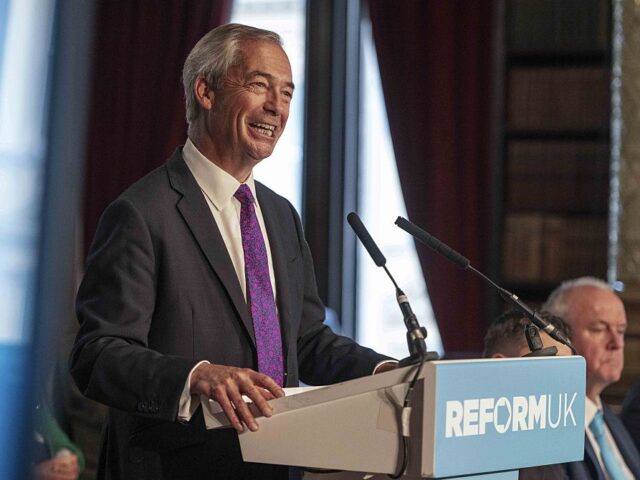Reform Largest Party, Finds Poll, But Euro-Style ‘Rainbow Coalition’ Could Keep Farage Out of No.10

Nigel Farage’s Reform UK Party would win the next general election, a major new poll finds, but the continuing Europeanisation of British politics sees the poll show no realistic combination of parties except a rainbow coalition could form a new government.
Pollster YouGov says if a general election was held tomorrow Nigel Farage’s Reform UK would jump from the just five seats it has now to a historic 271 in a Parliament of 650 seats. The vast majority of these would be taken from the presently ruling Labour Party, it found, which would tumble from 411 seats to 178.
This Labour wipeout would see swathes of its front bench lose their seats, with senior Labour politicians including Deputy Prime Minister Angela Rayner, the Home Secretary Yvette Cooper, and the Minister of Defence John Healey all turfed out by voters. The only region of the whole United Kingdom where Labour would retain a local majority is London.
The Conservatives — until recently a fact of life in Britain and unassailably the traditional party of government — are predicted to further fall into obscurity, tumbling from the historic-low 121 seats won last year to just 46 seats and crushing fourth-place status.
The poll, which took the views of some ten times as many voters as a regular British general election poll, is of the Multilevel regression and post-stratification (MRP) type which models predicted election results on a constituency-by-constituency basis rather than broader nationwide swing. Pollsters claim MRP polls are much more accurate, but given their scale they are expensive: this is the first YouGov MRP since the last British General Election, almost exactly one year ago.
In that vote turnout was extremely low and Sir Keir Starmer’s Labour Party got so few votes that, in normal times, their final tally was the number of ballots the losing party would expect to receive. Nevertheless, the votes were distributed in a way for Labour to get the very most out of the First Past The Post electoral system and with a historic low number of votes the party was awarded a historic high number of seats.
What might be thought of by some as a lack of a really solid popular mandate has not bothered Sir Keir, who has used his enormous parliamentary majority to push through a radical agenda. But only a year after the election the cracks are starting to show: the Prime Minister is fighting a potentially leadership-ending rebellion by his own Parliamentarians in the Commons, polling shows his personal approval at rock bottom levels, and now a large poll shows a Labour wipeout looming.
YouGov said they had run multiple computer simulations of how the next General Election might go based on their research and said they had found that in 99 per cent of cases, Reform UK would be the largest party. Yet 271 seats is well short of the 326 seats needed to command the house with a majority, and YouGov said Reform was the largest party but falling short of a majority in 97 per cent of the simulations they ran.
This is typical of mainland European politics, where parliaments are generally dominated by a mosaic of smaller parties and coalition governments are the norm. Such an outcome was unthinkable in Britain until very recently, but the fracturing from two legacy parties into half a dozen or more smaller factions appears to be here to stay.
Unfortunately for Reform, this also opens the door for the European-style stitch ups now so often seen. In a pattern repeated time and time again this century, what may be a right-wing populist party emerges as the single largest party after an election but is frozen out of power by a coalition of smaller parties which may be from the left, or may even be a ‘grand’ or ‘rainbow’ coalition of all factions united in one mission only, to keep border control right out of power.
And if the YouGov predictions today were reflected in a real-life election, that would be the only route forward, most likely, beyond throwing the question back to the country with a snap election. A Reform-Conservative coalition seems unlikely and, in any case wouldn’t have enough seats to control the house. Only a rainbow coalition of every single party but Reform could form a government, and that is without precedent in British history.